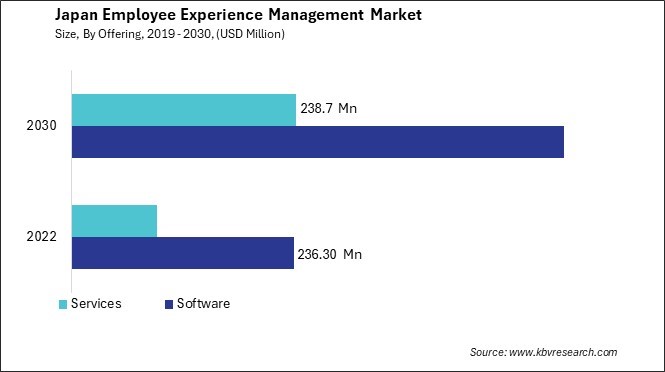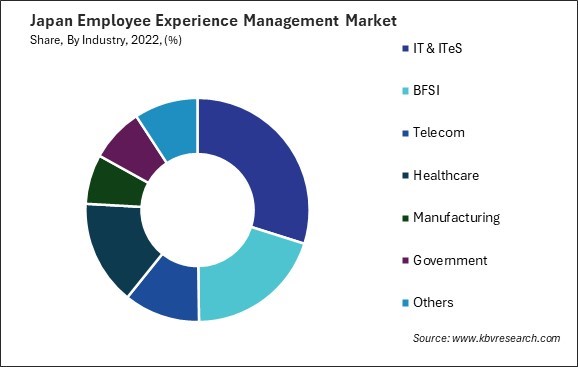Int'l : +1(646) 832-2886 | query@kbvresearch.com
Int'l : +1(646) 832-2886 | query@kbvresearch.com
Published Date : 17-May-2024 |
Pages: 90 |
Formats: PDF |
The Japan Employee Experience Management Market size is expected to reach $761.4 Million by 2030, rising at a market growth of 11.3% CAGR during the forecast period.
The Japan employee experience management market is experiencing a substantial upswing in demand due to the growing recognition among Japanese organizations of the pivotal significance that employee engagement, satisfaction, and well-being play in fostering business prosperity. Against a rapidly evolving workplace landscape and shifting employee expectations, the demand for employee experience management (EXM) solutions and services in Japan is driven by a growing emphasis on creating positive and meaningful experiences for employees throughout their journey within an organization.

The evolving nature of work in Japan, which is marked by the emergence of the gig economy, digital transformation, and remote and hybrid work models, is a significant contributor to the rising demand for EXM. As organizations adapt to these changes, there is a growing realization that traditional employee management and engagement approaches are no longer sufficient. EXM has become a critical strategic priority for companies operating in Japan that aim to foster an empowering, dynamic, and inclusive workplace that meets the demands and expectations of a diverse workforce.
Moreover, in light of the difficulties presented by remote work and the imperative to preserve a sense of camaraderie and inclusion among staff, the COVID-19 pandemic has expedited the implementation of EXM in Japan. The global health crisis has brought to the forefront the significance of employee mental health and well-being, resulting in a heightened emphasis on enterprise resource planning solutions that facilitate remote engagement, communication, and collaboration while placing employee wellness first.
Moreover, the competitive talent landscape in Japan has further fueled the demand for EXM, with organizations recognizing the need to differentiate themselves as employers of choice. EXM tools and strategies are increasingly seen as critical drivers for attracting and retaining top talent, as they enable organizations to create compelling employee value propositions beyond traditional compensation and benefits.
In Japan, there is a growing trend toward using employee experience management support and maintenance services as organizations recognize the importance of sustaining and optimizing their EXM initiatives. These services are crucial in helping businesses maintain a positive and engaging employee experience by ensuring the smooth operation and continuous improvement of EXM platforms and strategies.
One key driver behind Japan's growing use of EXM support and maintenance services is the increasing complexity of EXM platforms and technologies. As organizations adopt more advanced EXM solutions to meet the evolving needs of their workforce, there is a growing need for specialized technical expertise to manage and maintain these platforms effectively. EXM support and maintenance services provide businesses with access to professionals who can troubleshoot issues, perform upgrades, and ensure the overall health and performance of their EXM systems.
Furthermore, the growing reliance on EXM platforms as strategic tools for talent management and employee engagement has heightened the importance of ensuring their reliability and effectiveness. Businesses in Japan are increasingly investing in EXM support and maintenance services to proactively monitor and optimize their EXM platforms, minimizing downtime and maximizing their impact on employee satisfaction and productivity. This proactive approach helps organizations address potential issues before they escalate, ensuring a seamless and consistent employee experience.
With the shift to remote and hybrid work models, businesses rely more heavily on digital platforms to engage and connect with their employees. As a result, there is an increased need for EXM support and maintenance services that can address the unique challenges of managing EXM initiatives in a distributed and digital-first environment. Therefore, as organizations prioritize employee engagement and well-being, the demand for specialized support and maintenance services that can ensure the reliability and effectiveness of EXM platforms is expected to grow, shaping the future of the market in Japan.
Japan's manufacturing sector is experiencing rapid expansion, driven by factors reshaping the industry landscape and driving innovation across various sub-sectors. An important factor contributing to the swift growth of Japan's manufacturing industry is the expanding implementation of cutting-edge technologies, including artificial intelligence, robotics, and automation. These technologies are revolutionizing manufacturing processes, enabling greater efficiency, flexibility, and precision in production. Japanese manufacturers are leveraging these technologies to optimize operations, reduce costs, and improve product quality, positioning themselves at the forefront of global manufacturing competitiveness.
Moreover, Japan's manufacturing sector is experiencing expansion driven by its leadership in key automotive, electronics, and precision engineering industries. These industries have been instrumental in driving the country's economic growth and technological advancement, and they continue to be major contributors to Japan's manufacturing prowess. The sector's expansion is fueled by ongoing research and development efforts, strategic investments in innovation, and a focus on producing high-value-added products that cater to global demand.
Furthermore, the expansion of Japan's manufacturing sector is leading to a greater emphasis on workplace culture and employee well-being. As companies grow and evolve, fostering a positive work environment that promotes employee satisfaction, collaboration, and innovation is necessary. EXM solutions play a vital role in enabling companies to measure and improve the employee experience, identify areas for enhancement, and implement initiatives that enhance workplace culture and well-being. This is particularly important in the manufacturing sector, where the nature of work can be demanding, and employee morale and motivation are essential for maintaining high levels of productivity and quality.
Moreover, the rapid expansion of Japan's manufacturing sector is creating a need for EXM solutions to support a diverse and distributed workforce. Companies may have teams spread across different locations or work remotely as they expand their operations. EXM tools facilitating communication, collaboration, and employee engagement across geographical boundaries are becoming increasingly important for ensuring a cohesive and connected workforce. These tools enable companies to maintain a consistent employee experience regardless of location, fostering a sense of unity and belonging among employees. Thus, these factors will aid in the growth of the market.

The Japan employee experience management market features diverse companies offering innovative solutions to enhance employee experience across various industries. These companies provide a wide array of EXM tools and services designed to improve employee engagement, satisfaction, and productivity in the workplace.
Global technology leaders such as SAP, through its SAP SuccessFactors platform, and Microsoft, with its Microsoft Viva platform, are prominent players in the Japan market. These companies offer comprehensive EXM solutions that integrate with their broader suite of workplace productivity and collaboration tools, providing businesses with a unified platform for managing the entire employee experience lifecycle, from onboarding to performance management and employee well-being.
In addition to global technology giants, there are specialized EXM solution providers that cater to the unique needs of businesses in Japan. These companies focus on delivering targeted EXM solutions tailored to specific industries or organizational requirements. For example, Qualtrics, now part of SAP, offers a comprehensive EXM platform that includes employee feedback, surveys, and sentiment analysis tools. It allows businesses to gather real-time insights into the employee experience and take proactive measures to improve it.
Furthermore, human capital management (HCM) software providers such as Workday and ADP offer EXM modules as part of their broader HCM suites. These companies provide businesses with integrated solutions for managing all employee lifecycle aspects, including recruitment, onboarding, performance management, and employee engagement. Their EXM offerings often include employee self-service portals, social collaboration tools, and performance analytics to enhance the overall employee experience.
Moreover, some specialized EXM consulting firms and service providers in Japan offer expertise in designing and implementing employee experience strategies. These companies work closely with businesses to assess their current employee experience, identify areas for improvement, and develop tailored EXM solutions that align with their organizational goals and culture. They often provide employee surveys, organizational assessments, and change management support to help businesses optimize their employee experience initiatives.
In conclusion, the Japan employee experience management market is characterized by global technology leaders, specialized EXM solution providers, HCM software vendors, and consulting firms, each offering unique capabilities to enhance the employee experience. As businesses in Japan continue to prioritize employee engagement and well-being, the demand for innovative EXM solutions and services is expected to grow, further expanding the landscape of the employee experience management market in the country.
By Offering
By Industry